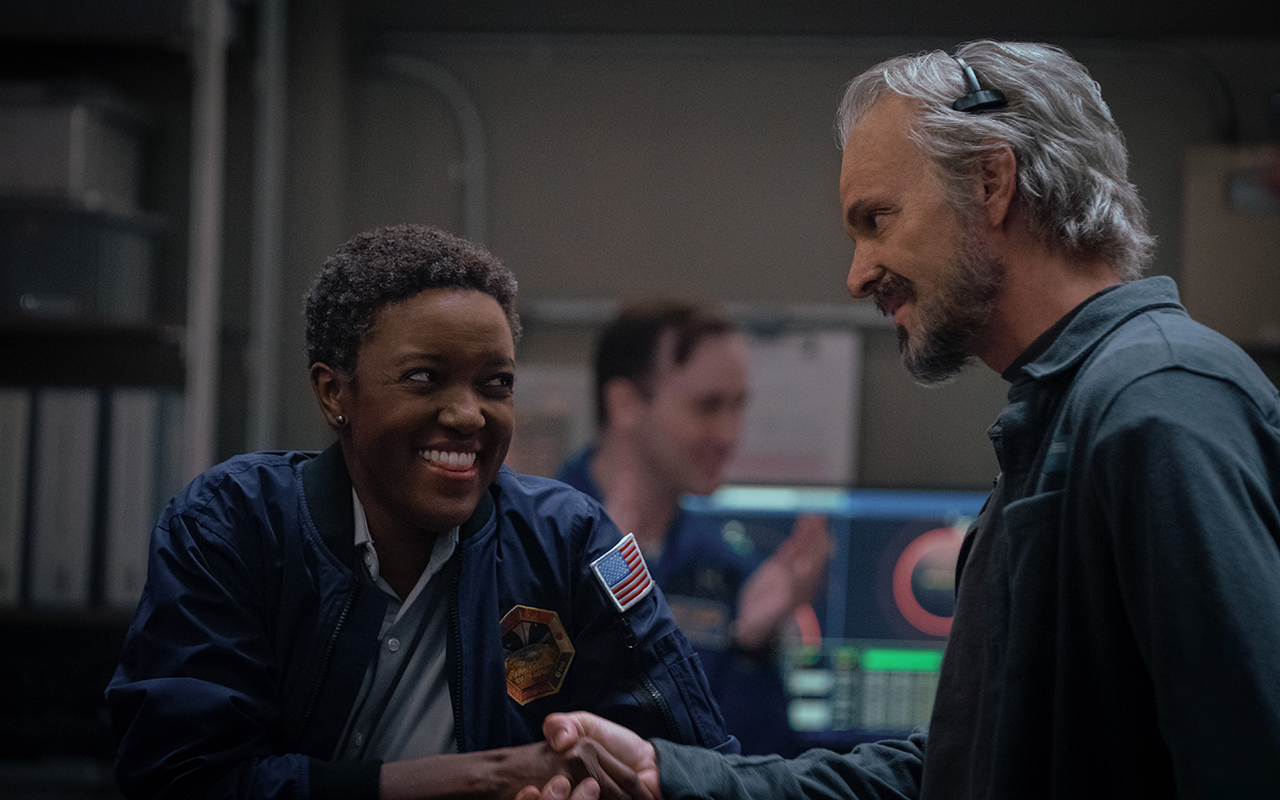'For All Mankind' Season 4 hopes to get audiences excited about space
'For All Mankind''s fourth season moves the story ahead another decade, with more imaginative tech.

NEW YORK — "For All Mankind" is about to enter its fourth season, and by now, fans know that the show walks a delicate tightrope.
For some viewers, it's an intense alternate-history drama, shining a light on real people and situations that could have altered the world we know in subtle ways. For others, it's an optimistic sci-fi adventure, extolling the virtues of space exploration and international cooperation. According to the show's crew, that's all by design.
Space.com attended New York Comic Con 2023 and met three of the pivotal people behind "For All Mankind." We spoke with executive producer Ronald D. Moore, as well as showrunners Matt Wolpert and Ben Nedivi. The three discussed how Season 4 will (and won't) differ from its predecessors, as well as where the show might go from here.
Related: 'For All Mankind' to lift off for 4th season on Apple TV+
Realistic science-fiction
In case you haven't watched it, "For All Mankind" is an Apple TV Plus original show, which envisions an alternate history where the United States and the USSR collaborated to make great strides in space exploration. The first season of the show begins in 1969, but each season advances the timeline by about 10 years. Season 4, which will debut on Nov. 10, will take place in an alternate 2003.
By this time in the show's history, humanity has not only created a thriving space program; it has also established permanent settlements on the moon and Mars. Plasma engines facilitate (relatively) fast space travel, and mining asteroids for valuable resources seems to be just within reach.
When I asked how much the show was inspired by real astronomy, Moore replied, "Quite a bit."
Get the Space.com Newsletter
Breaking space news, the latest updates on rocket launches, skywatching events and more!
"We take pride in always trying to keep the show scientifically plausible," he said. "It's scientifically accurate to the extent that we can be. In Seasons 1 and 2, when we were dealing with real spacecraft, we took pains to have people who knew how they actually operated [or] what the vehicles were capable of … How we treated the moon: What was realistic to happen, what wasn't, how it moved, its relationship to Earth, on and on.
"We always wanted the audience to believe these things could actually happen," he concluded.
Longtime fans may well recognize Moore from his work on "Star Trek: The Next Generation" and "Battlestar Galactica." While there are some tonal similarities between these shows and "For All Mankind," the level of technology is extremely different. I asked Moore how the "realism" factor affected the production of the show.
"The difference between this and 'Star Trek' is the historical factor," he said. "We always wanted this story to be attached to the real timeline. We're always going back and forth, positing that, well, if this changes, how would it affect the story?"
Moore explained that keeping track of history is somewhat important for a show like "Star Trek," where the Federation, Starfleet, and various parallel timelines all had their own backstories that affected the main plot. "For All Mankind," on the other hand, relies on real-world history at every turn.
"'For All Mankind' has a tremendous amount of time taken up in the writers' room with research on how the dominos might fall in certain things," he said. "The geopolitical aspect of it is a much bigger part of the show than it was in 'Star Trek.'" He discussed each season's 10-year jump, and how it affected the tone of the story. Season 1 was about the space race; Season 2 was a Cold War story; Season 3 was about the feasibility of colonizing a whole new planet.
Video: Take an astronaut-led tour of the 'For All Mankind' moon base
Real-world issues

As for the major themes of Season 4, Moore cited "capitalism" as a big one. Now that humanity's technology has advanced far enough to mine asteroids, the valuable materials within could create conflict between various factions.
"What is to be culled from asteroids in the asteroid belt, and how will that affect the people on Mars?" he asked. "How will it affect the economies of Earth? These big changes are starting to come about. The entrance of the true commercialization of spaceflight is probably the biggest change in Season 4 — the idea that we're still people, even as we do these amazing things. We take with us all our human foibles and flaws and gifts. It's still a show about people, and it's still a show about the human condition as you go out into space."
Even if "For All Mankind" shows an ugly side of humanity, though, the showrunners still want to get an optimistic message across.
"Going into the future, it will also be really interesting to keep playing out that thought exercise of, 'How will the world keep improving — or not always improving — in different ways that are unexpected and fun?'" Wolpert asked.
"We grew up in an era where the space program was dying out a little bit," Nedivi added. "The passion and dedication toward space travel promised by John F. Kennedy went away. It wasn't there. We always felt that if this show helps inspire even a few people to invest more in future space travel, or be interested more in space travel, or even follow more of what's going on and encourage it to continue, that would be an incredible accomplishment.
"The things we read in sci-fi inspire what we do in reality," he concluded. "The stories we tell, in all these movies and these shows, help inspire kids and others to really look at this, not as something that's just a fantasy, but as something that's possible, and within our lifetimes. That's the ultimate goal."
For All Mankind's fourth season will debut on Apple TV Plus on Nov. 11. Apple released a new trailer at NYCC 2023, and encouraged viewers to catch up on the first three seasons in the meantime.
The first three seasons of "For All Mankind" are available to stream on Apple TV+
Join our Space Forums to keep talking space on the latest missions, night sky and more! And if you have a news tip, correction or comment, let us know at: community@space.com.

Marshall Honorof is a senior editor for Tom's Guide, overseeing the site's coverage of gaming hardware and software. He comes from a science writing background, having studied paleomammalogy, biological anthropology, and the history of science and technology. After hours, you can find him practicing taekwondo or doing deep dives on classic sci-fi.









